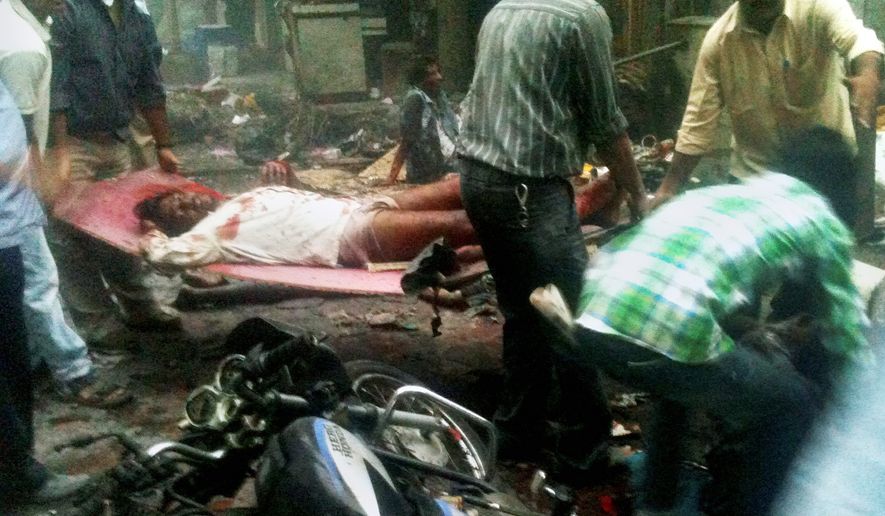MUMBAI — Three homemade bombs exploded during Wednesday’s evening rush hour in a coordinated strike at the heart of India’s commerce capital, killing at least 21 people and wounding 141 in Mumbai’s second terrorist attack in three years.
Blood splatters, twisted metal and sco rched walkways marred the upscale neighborhoods where the bombs were detonated. Police, firefighters, rescue teams and ordinary residents scrambled for hours to clear the areas and take the injured to hospitals.
“We first thought it is a cylinder blast. Then people started running everywhere. They were in blood. I put eight of them in cabs,” said an eyewitness who identified himself only as Suraj.
Prithviraj Chavan, chief minister of Maharashtra state, where Mumbai is located, said 21 people were killed and 141 wounded in the attacks. Tallies of the dead and wounded were expected to rise through the night.
Mumbai and other Indian cities were put on high alert after the blasts.
India’s National Investigation Agency (NIA) has been sent to Mumbai to probe the attacks.
The blasts occurred between 6:45 and 7 p.m. in crowded, upscale areas of the city. Indian Home Minister P. Chidambaram in New Delhi confirmed that the explosions were set by terrorists with homemade bombs.
“India is not going to cow down,” Cabinet Minister Farooq Abdullah said. “Let those perpetrators of this terror remember, we will find them and Inshallah [God willing] we will give them the justice that India believes in.”
No one immediately took responsibility for the attacks, but the Home Ministry said it suspects the bombings were conducted by the Indian Mujahideen, a front group of the Pakistan-based militant outfit Lashkar-e-Taiba (LET).
LET was blamed for the 2008 Mumbai terrorist attack in which 10 militants armed with assault rifles and grenades laid siege to luxury hotels, a Jewish center and other sites for three days, killing 166 people including six Americans.
Peace talks between India and Pakistan broke down in the immediate aftermath of the assault and only recently had begun again.
India has accused Pakistan’s Inter-Services Intelligence agency of supporting LET and other militant groups to weaken India’s rule in Kashmir, a region that both countries claim. Pakistan has denied the charge.
On Wednesday, Indian Prime Minister Manmohan Singh in New Delhi denounced the bombings as he appealed for calm among residents.
“I strongly condemn the bomb blasts in Mumbai this evening,” Mr. Singh said. “I have asked the chief minister of Maharashtra to do whatever is possible to provide relief to the injured and to the families of the deceased citizens.”
Pakistan issued a statement condemning the attacks.
“President Asif Ali Zardari, Prime Minister Yousuf Raza Gilani, the government and the people of Pakistan have condemned the blasts in Mumbai and expressed distress on the loss of lives and injuries,” Pakistan’s Foreign Office said.
In Washington, President Obama also condemned the “outrageous attacks.”
“The American people will stand with the Indian people in times of trial, and we will offer support to India’s efforts to bring the perpetrators of these terrible crimes to justice,” he said in a statement. “I have no doubt that India will overcome these deplorable terrorist attacks.”
Secretary of State Hillary Rodham Clinton said she will go ahead with her plans to visit India next week despite the bombings. Standing with India “is more important than ever,” she said.
Mumbai is open to the Arabian Sea and comprises seven islands that routinely bustle with about 20.5 million people who migrate from all over India to find work. The city is the capital of the western state of Maharashtra and is India’s financial center.
“Mumbai is targeted because it is the financial heart of India,” said Mr. Chavan, the state’s chief minister.
A senior police official in Mumbai said the explosions tore through the Dadar West, Opera House and Zaveri Bazaar areas of the city - each a heavily traveled, tony neighborhood with shops, restaurants and train stops.
One bomb exploded in a car in Dadar West near a railway station in central Mumbai, and another bomb was detonated in a jewelry shop in Zaveri Bazaar, witnesses said.
The city has been on edge since the 2008 attack. In December, authorities deployed extra police on city streets after receiving intelligence that a Pakistan-based militant group was planning an attack over New Year’s weekend.
In March 2010, Mumbai police said they prevented a major terrorist strike after they arrested two Indian men, who, police said, were preparing to hit several targets in the city. In September, police issued a terror alert for the city during a popular Hindu festival.
Last month, India and Pakistan held their first formal talks on the disputed region of Kashmir since the 2008 Mumbai attacks. Both nuclear-armed nations claim Kashmir in its entirety, and have fought two of their three wars over the region since they gained independence from Britain in 1947.
• This article is based in part on wire service reports.




Please read our comment policy before commenting.